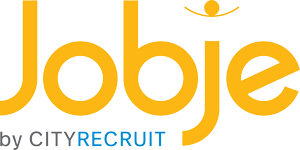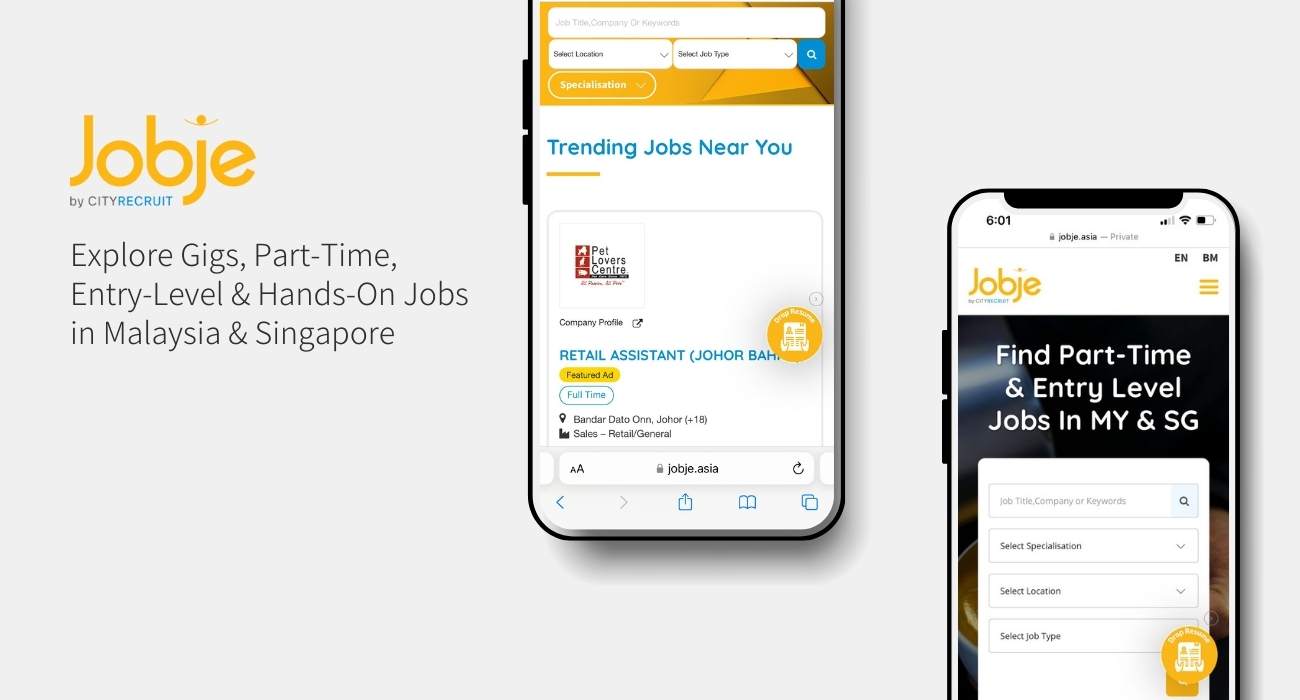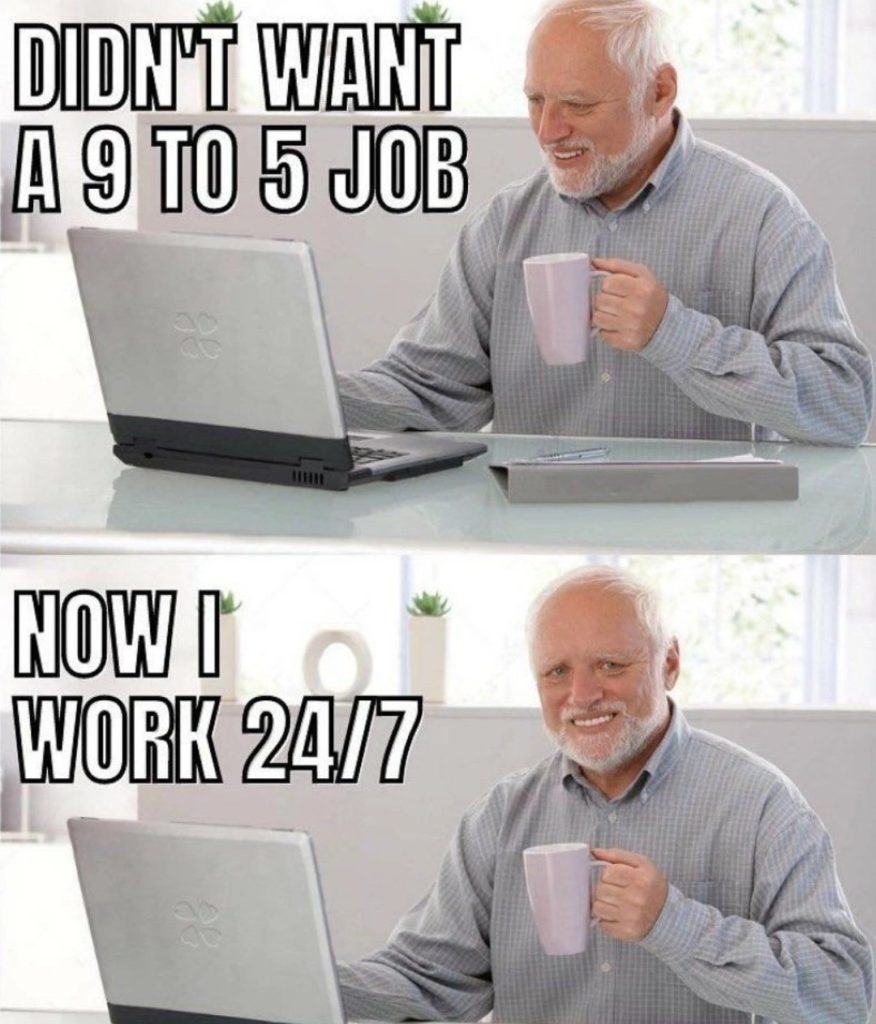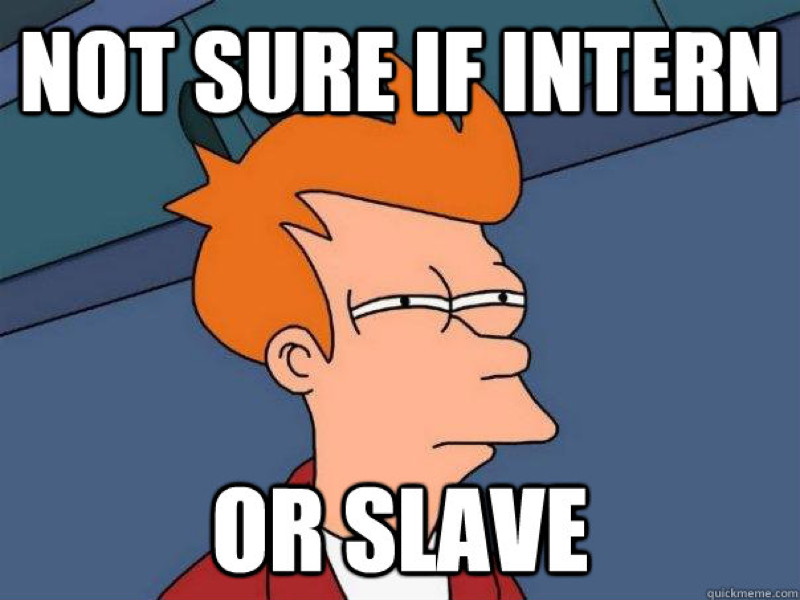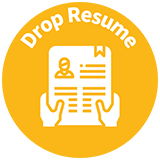Modern society has evolved our understanding of what employment means. Just as career expectations change, so do the types of employment available to us.
Not all jobs are created equal. Some offer freedom, others bring stability. The key to a fulfilling career? Finding the right type of work arrangement that fits your lifestyle. And no lah, you’re not stuck choosing between the classic 9-to-6 or unemployment.
Curious about which job type works for you? Read on.
1. Full-Time Employment
The OG type of employment, most commonly found on job portals like JobJe.Asia.
What It Is
Your quintessential clock-in, clock-out kind of employment. Most companies practice a 40-hour workweek, though some set working hours between 35 and 45 hours per week.
Key Features
- Fixed monthly salary with standard employment entitlements like EPF and paid time off (such as Annual Leave and Medical Leaves)
- Full benefits package including paid leave and overtime rates (if applicable)
- Clear career progression within the company structure
Pros
- Stable income: Regular paychecks make budgeting and financial planning easier
- Comprehensive benefits: Health insurance, EPF, and paid leave included
- Career growth: Clear promotion paths and professional development opportunities
- Job security: Better protection from sudden job loss through Employment Insurance (EIS)
Cons
- Limited flexibility: Set hours can restrict personal activities and side hustles
- Potential burnout: Long hours and high expectations can cause stress
- Commute required: Usually need to travel physically to the office
- Less variety: Same tasks and routine daily
Lifestyle Match
Full-time employment fits you if:
- Financial stability is your top priority (perfect for fresh grads with loans)
Are you a fresh grad new to the job search game? Check out our complete guide on how to apply for jobs for step-by-step tips.
- You prefer structure and routine over flexibility
- Career advancement matters more than immediate work-life balance
- You value comprehensive employment benefits packages
Example Industries
Full-time jobs exist in every sector, from private and public industries like banking and IT, to government services.
2. Remote or Hybrid Employment
Remember when “working from home” meant you were probably just watching Netflix in your baju tidur? Yeah, that stereotype died during the pandemic. Remote and hybrid employment types are now legit career options, and honestly? They’re a blessing for many of us.
What It Is
Remote work: Work entirely outside the traditional office; from home, cafes, co-working spaces, or even another country.
Hybrid work: Split time between office and remote locations (like 2 days office, 3 days home). Best-of-both-worlds flexible work arrangement.
Key Features
- Location flexibility: Work anywhere with an internet connection
- Digital collaboration: Connect via Zoom, Slack, or Google Meet
- Output-based performance rather than hours logged
- Standard benefits often included (for full-time remote roles)
Pros
- No commute: Save time and money from traffic
- Work-life balance: Better control over schedule and personal time
- Global opportunities: Work for international companies without relocating
- Increased productivity: Many work better without office distractions
Cons
- Potential isolation: Working alone can feel lonely
- Blurred boundaries: Hard to separate work from personal life
- Self-discipline required: Need focus without supervision
- Tech dependency: Internet issues can disrupt your workday
Lifestyle Match
Remote or hybrid employment types are ideal for:
- Global workers accessing international job markets
- Introverts thriving in independent work environments
- Travel lovers wanting to work while exploring
- Anyone prioritising work-life balance and schedule flexibility
Industry Examples
Tech, marketing, design, customer service, data analysis, and project management.
3. Part-Time Employment
Need money but also need schedule flexibility? Wonder got that kind of job or not? Got lah! It’s part-time employment.
What It Is
Part-time employment means working 30% to 70% fewer hours per week than full-timers. This employment classification can involve shift work, weekend schedules, or specific hours that suit both you and your employer. You’re still entitled to SOCSO and EPF contributions.
Key Features
- Hourly wages with formal contract employment
- Scaled employment entitlements (like EPF and annual leaves) proportional to hours worked
- Flexible schedule
Pros
- Schedule Flexibility: Work fewer hours or non-standard schedules
- Better work-life balance: More time for personal interests, education, or family
- Multiple income streams: Work several part-time jobs or start side projects
Cons
- Lower income: Fewer hours mean smaller paychecks
- Limited benefits: Smaller employment entitlements and fewer leaves
- Less job security: Higher layoff risks during downturns
- Changing schedules: Hours may vary weekly, making planning tough
Lifestyle Match
Part-time employment options are great if you:
- Need flexible schedules for studying, parenting, or caregiving
- Want to explore different career types before committing
Psst! Looking for a career change? We have the know-how in our career-switching guide.
- Transitioning between life stages, like starting work or nearing retirement
- Value free time more than maximum income
Industry Examples
Retail, F&B, hospitality services, logistics, and tutoring.
4. Contract Employment
Looking for traditional employment benefits with a precise end date? Contract employment arrangements give you the best of both worlds: job stability and career flexibility.
What It Is
Fixed-duration employment with clear start and end dates. Duration may vary from 6 months to 2 years. You work like a full-time employee; standard benefits, working hours, regular paychecks, but with a predetermined contract end date.
Key Features
- Fixed-term employment contracts with clear start and end dates
- Regular salary and employee entitlement (such as EPF and SOCSO)
- Defined deliverables and responsibilities
Pros
- Higher pay rates: Earn15-20% more than a permanent staff to make up for fewer benefits
- Skill diversification: Experience different companies and industries quickly
- Clear Timeframe: Know exactly how long the commitment lasts
- Faster Resume Building: Gain diverse experience efficiently
Cons
- Job insecurity: No guarantee of contract renewal
- Limited benefits: Smaller employee package compared to full-timers
- Frequent Transitions: Must adapt to new workplaces regularly
Lifestyle Match
Contract employment suits you if you:
- Value diverse experience over company loyalty
- Want higher short-term pay despite fewer benefits
- Love building a broad professional network quickly
- Prefer testing employers before permanent commitment
Industry Examples
IT, marketing, HR consulting, finance, and event management.
5. Freelance or Self-Employed
Want to be your own boss—working at your own time (night owls rejoice!), wearing what you want (baju rumah as your work uniform), and working anywhere you like (mamak stall or that fancy new matcha cafe?)—freelancing is the way to go.
What It Is
Working for yourself with no fixed employer. You find your own clients, set your own rates, and decide which projects to take. Unlike contract work (tied to one company), freelancers juggle multiple clients simultaneously. You’re basically running a one-person business.
Key Features
- Self-sourced clients and projects
- Project-based payment rather than a fixed salary
- Full control over schedule, rates, and workload
- Self-managed taxes and retirement contributions
Pros
- Ultimate flexibility: Work whenever, wherever you want
- High income potential: Set your own rates and take unlimited work
- Skill diversity: Constantly learning through varied projects
- Creative control: Choose projects aligned with your interests
Cons
- Income instability: Makan besar on some days, other days eat Maggi
- No benefits: You carum sendiri for EPF, insurance, and sick days
- Constant client hunting: Always searching for the next project
- Potential isolation: Working alone without office camaraderie
Lifestyle Match
Freelancing is ideal for:
- Digital nomads wanting location independence
- Creatives needing autonomy over their work
- Parents or caregivers requiring ultra-flexible schedules
- Side hustlers building a business while working full-time
JobJe Pro Tip: Start freelancing as a side hustle before going full-time. This way, you build a client base and test the waters without risking financial stability. Find opportunities on freelance platforms like Upwork or our own JobJe work platform.
Industry Examples
Writers, graphic designers, web developers, coders, consultants, and content creators.
6. Internship or Apprenticeship
Looking to test-drive an industry before heading out to the real (working) world? An internship or apprenticeship can be a choice for you. They’re temporary positions designed to teach you real-world skills while you figure out if this career path is actually for you.
What It Is
Short-term positions designed for hands-on learning and skill-building. Can be paid or unpaid, often part of degree requirements or career exploration.
Key Features
- Fixed-term learning role (usually 3 to 12 months)
- Mentorship-focused with hands-on training
- Can be paid or unpaid
- May lead to full-time offers
Pros
- Hands-on experience: Learn by doing real work
- Resume boost: Real expertise makes you more employable
- Networking opportunities: Build professional connections early
- Career clarity: Test-drive careers before long-term commitment
Cons
- Low or no pay: Many internships pay minimally or nothing
- Limited responsibilities: May not get meaningful work
- Short duration: Ends just as you’re getting comfortable
Lifestyle Match
Internships and apprenticeships suit you if you:
- Are a student or fresh graduate needing experience
- Want to explore career paths before committing
- Are making a career change and building new skills (our first-time job seeker’s guide can help)
- Value learning over immediate high income
Industry Examples
Found across all industries like marketing, engineering, finance, design, journalism, and technical trades.
7. Gig or On-Demand Work
Want to be your own boss, similar to freelancing but more task-based? No interviews, no dress code, just open the app and start earning. Your car becomes a taxi, your bike becomes a delivery service, and your spare time becomes cash.
What It Is
Task-based work through digital platforms, where you pick up jobs whenever you want. No fixed schedule, no long-term commitment. Just open the app, accept tasks, complete them, and get paid. Think Grab drivers, Foodpanda riders, or event crew through platforms like FastGig and GoGet.
Key Features
- App-based platforms for finding and managing work
- Task selection freedom – accept what fits your schedule
- Quick payments (often daily or weekly)
- No formal employment contract
Pros
- Ultimate flexibility: Work whenever and wherever
- Quick earnings: Start making money almost immediately
- Easy entry: Minimal requirements to get started
- No commitment: Take breaks anytime without permission
Cons
- Income unpredictability: Earnings fluctuate with demand
- No benefits: No EPF, SOCSO, or insurance
- Platform fees: Apps take a cut of earnings
- Wear and tear: Vehicle maintenance costs for delivery or transport gigs
Lifestyle Match
Gig work is great for:
- Flexible earners working around other commitments
- Side hustlers wanting extra income without quitting their main job
- Students who can’t commit to fixed schedules
- Anyone valuing time control over income stability
Example Industry
Logistics, food and task services, and event crew
No matter which work style suits you, find opportunities on JobJe.Asia:
Choosing the Right Type of Employment for You
When deciding a career type that aligns with your lifestyle, here’s what to factor in:
Here’s the thing: there’s no one-size-fits-all answer. What works for your friend might not work for you, and that’s completely okay. The key is understanding what matters most to you right now.
1. What are your career goals?
- Are you chasing financial security or creative freedom?
- Do you want a clear promotion path or diverse experiences?
- Is skill-building or immediate income your priority?
Not sure which industries are booming? Check out our list of high-demand jobs in Malaysia for 2025.
2. What’s your personality like?
- Do you thrive with structure or crave spontaneity?
- Are you self-motivated or do you need external accountability?
- Do you prefer routine or variety in your daily work?
3. What life stage are you in?
- Fresh grad looking to learn and grow?
- Parent juggling family responsibilities?
- Mid-career professional ready to pivot?
- Student needing flexible income?
4. What are your financial needs?
- Need stable monthly income for commitments?
- Can you handle income fluctuations?
- Do you have financial cushion for transitions?
5. What’s your ideal work environment?
- Office energy or home comfort?
- Team collaboration or independent work?
- Fixed location or location freedom?
Here’s a quick snapshot to help you compare different employment types at a glance:
Career Match Guide
| Lifestyle Match | Employment Type |
| Loves routine and stability | Full-time employment |
| Need flexibility for commitments | Part-time or gig work |
| Want variety and career growth | Contract or freelance work |
| Exploring career options | Internship or part-time work |
| Crave freedom and autonomy | Freelance, gig or remote work |
| Want the best of both worlds | Hybrid employment |
Design a Career That Fits Your Life
In today’s job market, your career doesn’t have to fit into one box. Whether you crave structure, freedom, or a mix of both, there’s an employment type that fits your lifestyle.
Gone are the days when climbing the corporate ladder was the only “acceptable” path. Now, you can build a portfolio career, shift between roles as your life evolves, or combine multiple work styles to create your ideal balance.
Whether you’re looking for a stable full-time role, a flexible gig, or a hybrid setup, JobJe makes it easy to explore all employment types in one place. Start matching your lifestyle to your next opportunity. Visit JobJe.Asia or connect with us on WhatsApp for personalised career guidance.
FREQUENTLY ASKED QUESTIONS
1. What is the most common type of employment in Malaysia (or globally)?
Full-time employment remains the most common, especially in corporate and government sectors, due to its job stability and benefits.
2. Can I combine different types of employment?
Absolutely! Many people mix full-time jobs with freelance side projects, or work part-time while building their own business to diversify income or pursue passions.
3. What’s the difference between contract and freelance work?
Contract work involves fixed agreements with one employer for a set period, while freelance work often involves multiple clients and flexible timelines.
4. Which employment type offers the best work-life balance?
Remote, hybrid, and part-time roles typically offer greater flexibility. But it depends on your personal discipline and the nature of your job.
5. How can I find out which employment type suits me best?
Reflect on your goals, preferred work environment, and financial needs. You can also take career personality tests or speak with a career advisor.
